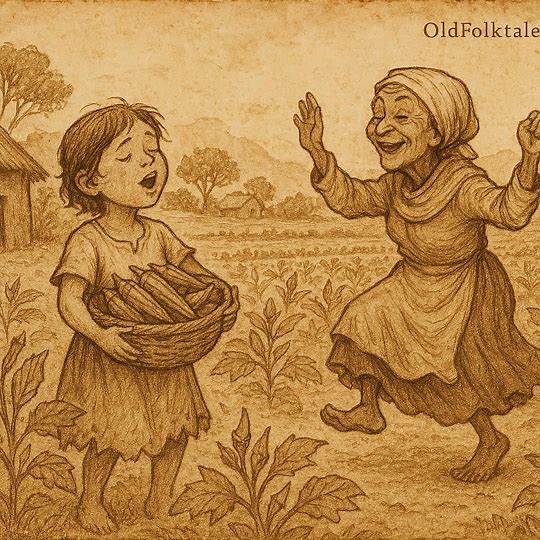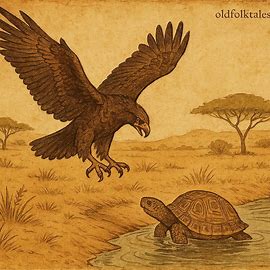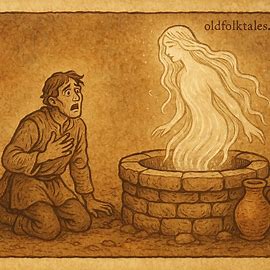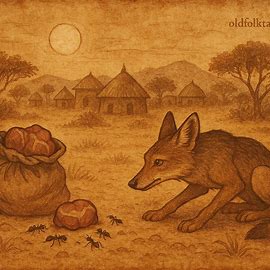In a small Mossi village of Burkina Faso, a woman had passed away, leaving her young daughter in the care of her husband’s second wife. The stepmother, harsh and demanding, treated the orphan girl cruelly. One day, as the okra in the bush reached its full height and the harvest season came near, the stepmother ordered the orphan to go into the bush and gather it. The little girl, tears streaming down her cheeks, rose early, her tiny hands trembling with fear, and began singing a plaintive tune to accompany her walk through the wild okra fields.
“Jelengen jelengen kende!
My father had a second wife,
Jelengen jelengen leelfe!”
Her voice, high and clear, floated across the fields. With each step, she plucked the ripe okra pods, placing them carefully in her basket. She sang as she moved from one village path to another, from Kculyoog to Tt-gijmo, hoping that the spirits of the wild or the forest genies would notice her plight and offer her protection.
As she worked, the orphan girl encountered an old woman, leaning on a crooked staff. The old woman smiled warmly and encouraged her to continue singing, explaining that her song would make her dance with joy. The girl obeyed, her voice rising in hope and rhythm, and the old woman twirled and stamped her feet with delight. When the dance ended, the old woman spoke gently:
“Come with me to my home,” she said. The orphan, sensing kindness in the stranger’s eyes, followed her through winding paths to a small, tidy house nestled among tall trees.
Once inside, the old woman prepared for her bath and asked the orphan to scrub her back. The girl hesitated, noting the roughness of the old woman’s skin, but watched closely. After the bath, the woman asked:
“Do you want me to make you some red sorghum porridge or some corn porridge?”
“At home, we have only corn porridge,” replied the orphan shyly. So, the woman prepared a warm bowl of corn porridge, and the girl ate hungrily, her spirit lightened by the kindness shown to her. She went to sleep that night with a heart full of gratitude.
The next morning, the old woman called to her:
“Place your right hand into this hole,” she instructed. The girl obeyed, and when she drew it out, her hand was covered in gleaming gold, shining up to her arm. Amazed, she followed the woman’s next command, thrusting her left hand into another hole, and again, gold covered her arm.
READ THIS: Poko and Raogo: A Mossi Folktale That Teaches Lessons on Justice and Fate
Satisfied, the old woman allowed the girl to return home. When she arrived, the stepmother’s daughter ran to her mother, claiming the orphan girl had returned adorned with gold. The stepmother, jealous and furious, berated her daughter for desiring such wealth and forced her into the bush to gather okra, hoping she could replicate the magic.
The girl left crying, singing another plaintive song:
“Wu wee yi yee!
Wtt wtt n ke yee!”
Following the familiar path, she encountered the same old woman, who encouraged her song once more. This time, however, the orphan faced trials: her right hand thrust into a hole was bitten by a coiled snake, her left hand stung by a scorpion, and when she bravely thrust her head into another hole, it emerged as if transformed, reminding all that misfortune may come to those who act from envy or greed rather than humility.
The girl returned home unharmed but wiser, bringing the lessons of patience, obedience, and respect for the unknown. She shared her experience with the villagers, and from that day on, the people learned to care for orphans, to respect elders, and to remain humble, no matter the wealth they might acquire.
Through her perseverance and humility, the orphan girl was rewarded not only with material gold but with the respect, love, and wisdom of her community.
Moral Lesson
This tale teaches the importance of humility, patience, and kindness. True reward comes to those who act with respect and sincerity, while greed and envy often bring misfortune. The orphan girl’s story reminds us that wisdom and humility are treasures greater than gold, and that caring for the vulnerable is a virtue to honor.
Knowledge Check
Who is the orphan girl, and what challenges does she face?
She is the motherless child forced by her stepmother to harvest okra and faces jealousy, danger, and hardship.
How does the old woman help the orphan girl?
She guides her, provides food, and reveals magical gold as a reward for humility and obedience.
What magical events occur when the orphan places her hands in the holes?
Her hands are covered in gold, but in subsequent trials, she encounters a snake, a scorpion, and a head-transformation challenge.
What lesson does the story teach about humility and envy?
Humility and obedience bring reward, while envy and greed bring danger and misfortune.
How does the stepmother’s daughter respond to the orphan girl’s success?
She becomes jealous and attempts to mimic her actions, which leads to trouble.
Where does this folktale originate?
Mossi people of Burkina Faso.
Source: Mossi folktale, Burkina Faso






